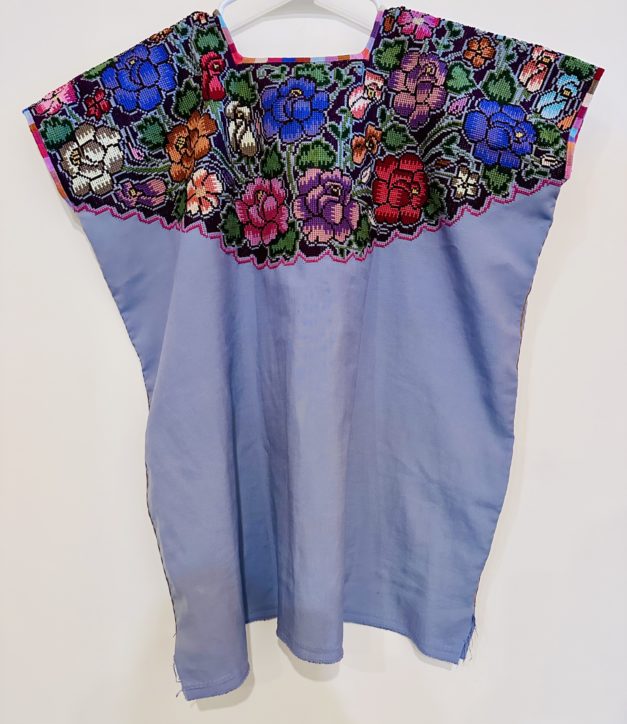At the end of a winding road about an hour-and-a-half up the mountain from MEX 200, the coastal highway leading north to Acapulco and beyond, is the Mixtec village of San Juan Colorado. Here, almost all the women weave and there are over thirty registered cooperatives. One of our favorites is Las Sanjuaneras. Why? They spin native cotton, make thread using the drop spindle (malacate), and use natural dyes.
About five years ago, two Oaxaca designers, Ana Paula Fuentes and Maddalena Forcella, got a grant to work with the cooperative to teach them natural dyeing and to introduce a weaving technique to create a lighter weight huipil that would be more comfortable in the hot, humid coastal climate. Of course, they still used traditional iconography in their textiles, telling the story of the village and traditions. The innovation has been successful and many collectors value what they create.
This is the fifth year we have come to visit them. When we arrived, the clothing was strung along lines between concrete posts, but before jumping in to the fray, we sat to hear about the cooperative and each woman’s story — when they started weaving, who they learned from, their hopes and dreams for themselves and their families.
So many are supporting their families because they are able to bring in a cash income from the sale of their textiles. This goes to pay for medical care (many of the elderly are sick, have problems with blood pressure or diabetes), educational costs for children and grandchildren, and food that supplements what the men are able to grow in the fields.
The cooperative is getting smaller. There were fifteen women last year. This year, two died. The eldest member of the coop is age 78 and the youngest in in her thirties.
They prepared a delicious lunch for us of caldo de pollo (chicken soup), homemade tortillas hot off the comal, grilled tasajo (seasoned beef), and lots of agua de jamaica (hibiscus water). Muy rico. I was so hungry, I forgot to take photos of the food.
And then, we got to put our hands on the glorious textiles!
Come with us in 2025! Send an email to say you are interested.

We invited Las Sanjuaneras coop members to choose the piece that was their favorite, and that they were most proud of. This was a wonderful way to see the range of colors and garments.


Above left, cooperative president Camerina Contreras, is finishing a huipil, dyed with jicara gourd, indigo, and embellished with native, hand-spun pre-Hispanic white cotton.


The oldest member of the coop speaks to us in Mixtec. Camerina translates to Spanish, and our cultural anthropologist guide Denise translates to English.


On the right, women wear the traditional wrap-around skirt of the region call a posahuanco. Today, it is made with synthetic dyes. It used to be dyed with indigo, cochineal, and purple snail dye. If you find one that is, it will cost 30,000 pesos. So rare.



Amazing clothing, delicious food, humble homes.



























































